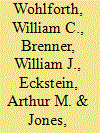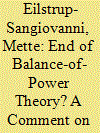| Srl | Item |
| 1 |
ID:
088562


|
|
|
|
|
| Publication |
2009.
|
| Summary/Abstract |
In her response to our article, Mette Eilstrup-Sangiovanni replaces balance-of-power theory (threat of hegemony begets balancing, which produces a tendency of international systems toward equilibria of power) with a complex congeries of competing and contingent conjectures about when states might balance. While these are certainly part of the extensive literature on the balance of power, lumping them together and calling them a `theory' invites a comedy of errors rather than an empirical test. The `ado' in our article was a novel empirical test of a theory that has been central to centuries of IR theorizing. As our review of the evidence confirms, this theory can indeed be evaluated in ancient and non-European international systems, and it is wrong: international systems do not tend toward equilibria of power, and balancing is relatively unimportant in explaining the equilibria that do occur. We end up agreeing with the gist of Sangiovanni's response: there is no empirically valid systemic balance-of-power theory, and it is time to turn to contingent middle-range hypotheses about balancing
|
|
|
|
|
|
|
|
|
|
|
|
|
|
|
|
| 2 |
ID:
088561


|
|
|
|
|
| Publication |
2009.
|
| Summary/Abstract |
The balance of power is one of the oldest and most venerable concepts in the study of International Relations. Few concepts have had a comparable influence on both scholarship and statesmanship, and few have been so fiercely contested. In a recent article, `Testing Balance-of-Power Theory in World History' (EJIR, June 2007), Wohlforth et al. set out to test balance-of-power theory against 2000 years of world history. Although their article has considerable merits, I highlight three main weaknesses in their approach. First, I argue that they misstate balance-of-power theory. Second, the competing theoretical hypotheses they offer are (a) not novel, (b) too vague to enable productive empirical testing. Third, the historical evidence they present, based on the study of ancient international systems, is too scant and impressionistic to be probative for the causal mechanisms they seek to evaluate. As a result, balance-of-power theory is neither refuted nor significantly refined.
|
|
|
|
|
|
|
|
|
|
|
|
|
|
|
|